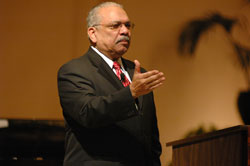Cathedral lecture series features national speakers
Evangelization starts in the heart of individuals, Detroit deacon says

Deacon Alex Jones spoke recently in the archdiocese.
By Sean Gallagher
As the evangelization coordinator for the Archdiocese of Detroit, Deacon Alex Jones has the chance to review many programs designed to help Catholics proclaim the Gospel.
But for him, evangelization boils down to individuals having an encounter with Christ and then sharing Jesus with others.
That was the message that Deacon Jones shared with more than 100 people gathered on Feb. 8 at SS. Peter and Cathedral in Indianapolis.
His presentation was the second in a lecture series held in observance of the cathedral’s centennial celebration.
“So often, we think that when we get involved in evangelization, we have to get some programs going,” Deacon Jones said. “Evangelization begins with you. God is calling you to a new and living relationship with him.
“We experience God. We encounter the Christ. And then we go on mission. It’s automatic.”
This message hit home with Eugene Hawkins, who attended the program.
As president of the parish council at Holy Angels Parish in Indianapolis, Hawkins helps oversee many pastoral programs in his faith community.
In that capacity, he recognizes that programs only take the faith into the broader community so far.
“[Evangelization] is really sharing what you believe on the inside,” Hawkins said. “People have got to feel that when you talk to them. If they don’t feel that, you’re not really evangelizing. It’s got to be in you, like they say about Gatorade.”
Deacon Jones in part exhorted his listeners to take personal responsibility for evangelization because in the late 1990s he had a profound encounter with the Church’s understanding of the Gospel message, calling it “the second greatest discovery of his life,” which was only preceded by a profound conversion experience in 1958.
At the time of his discovery of the Church’s message, he was the pastor of Maranatha Christian Church in Detroit, a congregation in the Evangelical and Pentecostal traditions.
When Deacon Jones started to research early Christian worship, he read the writings of the apostolic fathers, those spiritual writers of the generation immediately following the Apostles.
These readings led him closer to the Catholic Church.
“I shared it with my people. Of course, there were people who didn’t agree with me, and many left. But I was so excited,” said Deacon Jones, who—along with 54 members of his congregation—joined the full communion of the Church in 2001. He was ordained to the diaconate in 2005.
Deacon Jones told his audience at the cathedral that evangelization is important right now because of the increasing secularization of society.
“We live in a secularized world that is becoming ever more secular in its beliefs and in its operations,” he said. “Now that’s not necessarily all bad because when we have pluralism, we have to have a neutral, objective government.
“But it’s secular humanism that is seeking to eradicate faith or relegate it to the realm of superstition.”
Deacon Jones explained that the Second Vatican Council equipped the Church to respond to such secularization and to proclaim the Gospel in the 21st century.
He said it did this through its call to the faithful to enter into dialogue with the world, its universal call to holiness, its empowerment of the laity and its call for all the faithful to evangelize.
Evangelization is rooted in the faithful’s personal relationship with God, Deacon Jones emphasized.
“Encounter the resurrected Christ,” he said. “Let the life of God flow through you once again. And then, watch evangelization take off because you won’t be able to keep it to yourselves. You won’t be able to hold down what joy and what newfound peace that you have.”
Connie Morris, a member of Holy Angels Parish in Indianapolis, reflected on the personal nature of evangelization at the conclusion of his presentation.
“The word won’t get out unless we put it out,” Morris said. “It’s our responsibility as followers of Christ that if we say we have Jesus then we need to spread Jesus around.
“He’s not just for us. He’s for all people.” †
